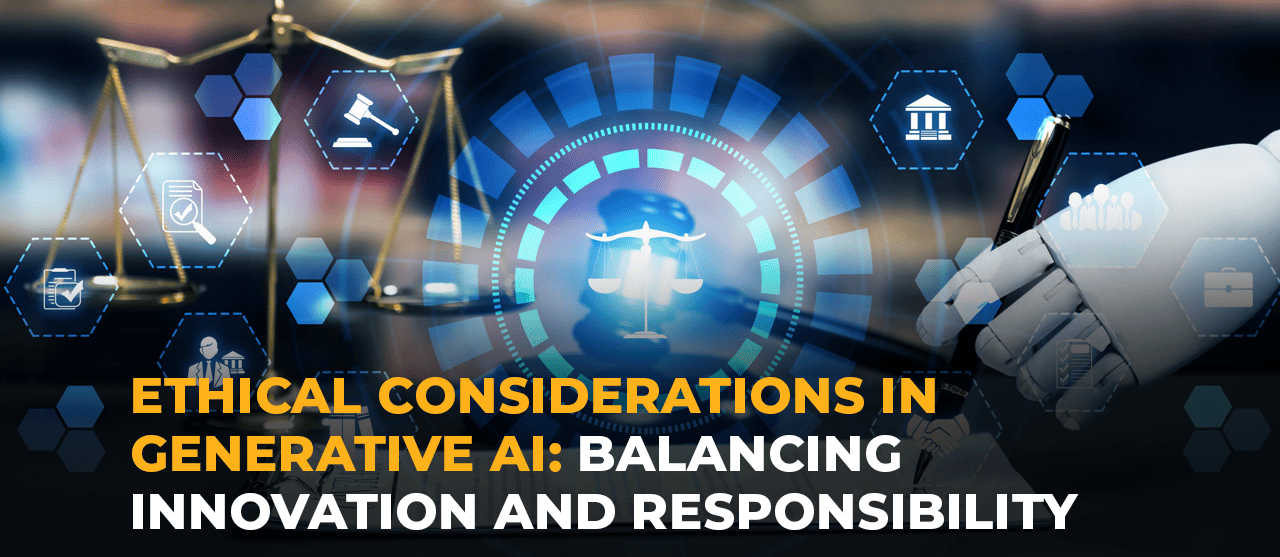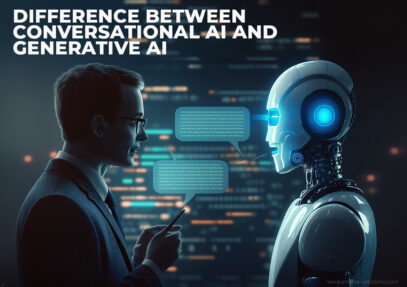
In the realm of cutting-edge artificial intelligence, Generative AI stands as a remarkable feat, unlocking unprecedented possibilities in creativity and problem-solving. However, as we witness the awe-inspiring capabilities of AI systems, it becomes imperative to tread cautiously and ponder the ethical ramifications of these innovations.
This blog explores the profound impact of AI technologies on society and the critical need to strike a delicate equilibrium between pushing the boundaries of innovation and upholding ethical responsibility.
What Is Generative AI?
Generative AI is a branch of artificial intelligence that focuses on creating machines capable of generating original content. Unlike traditional AI systems that follow predefined rules, Generative AI uses deep learning models to produce new data that resemble patterns from existing data it has been trained on. This versatile technology finds application in various domains, such as generating lifelike images, videos, musical compositions, and creative written content.
The Concerns Of Generative AI
The main concerns of Generative AI are as follows:
1. Bias And Fairness:
A critical ethical concern in Generative AI revolves around potential biases in the content it generates. If the AI model is trained on biased datasets, it can unintentionally perpetuate stereotypes and discrimination when producing text, images, or other outputs. Ensuring fairness and equity necessitates using diverse and representative datasets while closely monitoring the training process.
2. Privacy And Data Usage:
Generative AI models often rely on significant amounts of data for training, including sensitive or personal information. Respecting user privacy and obtaining informed consent for data usage becomes paramount to prevent unauthorized access or misuse of personal data during the generative process.
3. Misinformation And Deepfakes:
The ability of Generative AI to create highly realistic content raises concerns about the spread of misinformation and deepfakes. AI-generated fake content can lead to harmful consequences, from spreading false information to damaging reputations and inciting conflicts. Implementing robust verification mechanisms is vital to detect and prevent malicious use.
4. Transparency And Explainability:
Generative AI models are often complex, making it challenging to understand how they arrive at specific outputs. Ensuring transparency and explainability in AI decision-making is crucial to building trust with users and identifying potential biases or errors in the generated content.
5. Intellectual Property And Copyright:
Generative AI poses questions about intellectual property rights when it creates content that closely resembles copyrighted works or proprietary information. Balancing creativity and respecting existing copyrights is essential to avoid legal disputes and protect the rights of artists and creators.
6. Social Impact And Employment Displacement:
The widespread adoption of Generative AI could lead to job displacement in certain industries as AI-generated content becomes more prevalent. Addressing potential socio-economic impacts and ensuring a smooth transition for affected workers is essential for maintaining social stability and fairness.
7. Human Autonomy And Control:
Generative AI blurs the lines between human and machine-generated content, which can raise questions about human autonomy and control. Balancing human involvement and AI-generated assistance is crucial to ensure ethical decision-making and creative processes.
8. Accountability And Responsibility:
Assigning accountability for AI-generated content can be challenging, especially with autonomous systems. Establishing clear guidelines and accountability frameworks is necessary to attribute responsibility in case AI-generated content causes harm or violates ethical standards.
The Necessity Of Ethics In AI
The importance of ethics in AI cannot be overstated, given the growing integration of artificial intelligence in our daily lives. As AI systems increasingly influence diverse aspects of society, including employment, healthcare, and privacy, ethical considerations become vital to avoid potential negative impacts.
Without clear ethical guidelines, there is a risk of AI technologies being implemented without proper reflection on their consequences, potentially leading to biases, discrimination, and societal disruptions. Ethical principles offer a necessary framework to ensure AI development, deployment, and usage align with human values, promoting fairness, transparency, and accountability, while fostering trust and responsible innovation in this transformative field.
Conclusion
Exploring the realm of Generative AI has unveiled its awe-inspiring potential to transform creativity and innovation. Therefore, striking a crucial equilibrium between advancement and ethical responsibility takes center stage as we navigate the complex implications of Generative AI on society. Tackling issues like biases, privacy, misinformation, and transparency necessitates collective engagement from researchers, developers, policymakers, and the wider community.
It is important to keep yourself updated on the capabilities and concerns of Generative AI. EnFuse Solutions develops an AI data-quality roadmap to align precisely with your specific business objectives. Get in touch with us today.

















Comment